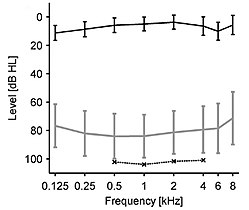Hyperacusis
Hyperacusis is a hearing health problem where people become more sensitive to some sounds for certain frequencies and volumes. This can make everyday sounds such as a car, dishwasher or refrigerator sound very loud. It is usually very difficult to tolerate and can be uncomfortable or even painful for people experiencing it.
Symptoms
The increasing sensitivity of the ears caused by hyperacusis is painful for many people. It can negatively effect the everyday lives of people experiencing it. It can make it very difficult and even not possible to do their everyday jobs and take care of their responsibilities. There are many symptoms experienced by those with hyperacusis.
- Annoyance or pain caused by noise that sounds normal to other people. Often quiet sounds are not a problem whereas normal conversations can be too loud
- Low sounds can still be too loud
- Dizziness and nausea from loud sounds
- Tinnitus affects a large portion - up to 89% - of those experiencing hyperacusis. Loud sounds can make tinnitus for these people worse
Causes
Like other hearing problems, hyperacusis can start suddenly or gradually over time. It can affect people of all different ages in one or both ears. There are a variety of possible causes:
- Extremely loud one-time sounds such as an explosion
- Head injury or damage such as caused by a fall or slap
- Long periods of exposure to loud sound
- Ear surgery and other medical procedures
- Diseases such as lyme disease and some medications
These are the main causes of hyeracusis and most hearing problems. There are other less common causes such as post-traumatic stress disorder.
Treatment
Hyperacusis cannot always be fully cured, but for most people the symptoms get better with time and treatment. People need to learn to use hearing protection against sounds which are very loud, but to not use these in everyday situations. Protecting the ears too much will make the symptoms worse instead of better.
- Sound therapy is a popular form of treatment that is usually used to treat tinnitus. It uses a noise-generator to put sound into the ears at a soft level for periods of time throughout the day in order to build tolerance to the pain caused by hyperacusis and to make the ears hear in a normal way again.
- Wear hearing protection in spaces with loud sounds to avoid pain
- Short term medication
- Counselling to better understand hyperacusis and to learn not to overprotect the ears.


